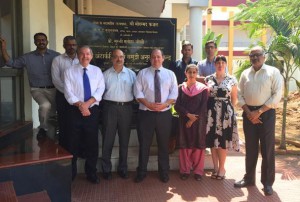23rd March 2015 New Delhi, India
Going to Goa on Business!
This is how my boss announced my recent official visit to my team members! Not surprisingly I got some envious looks…all in good fun of course as prompt came the reply that some were off to Kerala the week after – again on business of course! But I’m sure you’ll hear about that separately.
I was in Goa last month with delegates visiting from the South Georgia Future Science Project – Prof Paul Brickle, Dr Victoria Peck and Prof John Turner, to promote research opportunities in the South Georgia Islands located in the Sub-Antarctic region. As part of the project, the team were on a fact finding mission to better understand the international demand for science on and around South Georgia with the aim to ultimately advise what infrastructure and logistics would most benefit scientists in making South Georgia more accessible.
In Goa they visited the National Centre for Antarctic and Ocean Research (NCAOR) which is an autonomous R&D institution of the Indian Ministry of Earth Sciences which carries out research activities in the three poles – the Arctic, Antarctic and the Himalayas, as well as the Southern Ocean. NCAOR also leads on the co-ordination and implementation of the Indian polar expeditions as well as construction of new research stations and maintenance of existing stations in Polar Regions. Atmospheric and cryospheric sciences, in addition to paleoclimate, microbiology and remote sensing feature high within the NCAOR polar science strategy.
We were warmly welcomed by the Director, Dr S. Rajan and a number of his colleagues who spent the day with us, discussing NCAOR’s science strategy and the opportunities that South Georgia presents.
Dr. Rajan expressed keen interest in exploring the possibility of NCAOR to work within an international consortium on South Georgia. In this idealised model each institute can provide their niche expertise within a co-ordinated framework ensuring optimal utilisation of resources, logistics and expertise and generation of the best possible science. This concept is something that the South Georgia Future Science team are keen to promote and will be discussing further at a workshop which is proposed to be held in the Falkland Islands in August 2015.
 While in Goa, I also took the opportunity to visit the Council of Scientific and Industrial Research’s premier institute – the National Institute of Oceanography. Located in the picturesque Dona Paula area, it has over 200 scientists and 100 technical support staff and no doubt houses India’s largest community on oceanographic research, in addition to being an advanced centre of education in ocean sciences. With its well equipped labs, the institute attracts a number of foreign students for their doctoral studies or project work and would be keen to host UK students as well!
While in Goa, I also took the opportunity to visit the Council of Scientific and Industrial Research’s premier institute – the National Institute of Oceanography. Located in the picturesque Dona Paula area, it has over 200 scientists and 100 technical support staff and no doubt houses India’s largest community on oceanographic research, in addition to being an advanced centre of education in ocean sciences. With its well equipped labs, the institute attracts a number of foreign students for their doctoral studies or project work and would be keen to host UK students as well!
The major research areas being undertaken at NIO include biological, chemical, geological/ geophysical, physical, marine instrumentation and archaeology. In addition to basic research, the institute also carries out applied research sponsored by the industry that range from oceanographic data collection, environmental impact assessment to predicting environmental impact. The institute also provides consultancy on a number of issues including marine environmental protection and coastal zone regulations.
I was met by the Deputy Director, Dr Rajiv Nigam and Dr Rahul Sharma, who had invited their colleagues into the discussion on past and current collaborations with the UK and the possibility of NIO scientists applying for joint UK India projects under the Newton-Bhabha programmes. I am particularly thankful to Dr Rahul Sharma for coordinating my visit to NIO.
Helped by the fact that both these institutes of international repute are located at stone throw’s distance from the Arabian Sea, I managed to get sight of some of the gorgeous beaches of Goa!